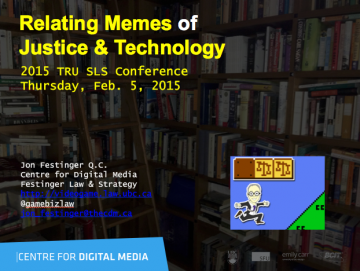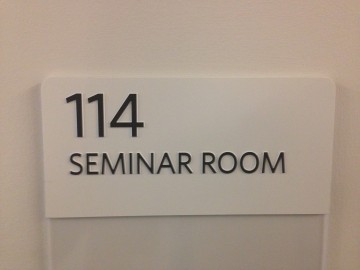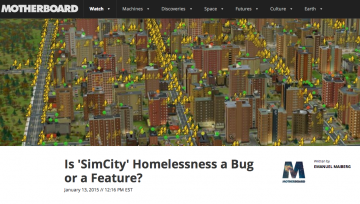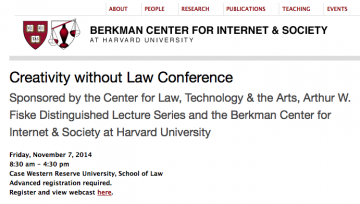Legal Contradictions Manifest in Video Game Worlds: Copyright through the Post-Structuralist Looking Glass
In the spring I was invited by my colleague Gaetano Dimita (http://www.law.qmul.ac.uk/staff/dimita.html) of The School of Law, Queen Mary University of London to participate in the second edition of an […]
Conference version of “Relating Memes of Justice & Technology”
Though most but far from all of the slides in this presentation to the 2015 SLS Conference at TRU Law on February 5, 2015 have made it into some the […]
Utilitarian Justifications at the Grammys
Recording Academy president Neil Portnow used the Grammys as an opportunity to highlight the importance of copyright protection, using a argument you might recognize as utilitarian: “What if we’re all watching the […]
Impact of twitter’s “mass shaming” problem
This article does a great job of showing the real-life impact of online harassment in the context of “naming and shaming” people on Twitter (it focuses on people who have […]
This American Life – Online Trolling as a Limit on Expression
Interesting piece referred to in class today, about a blogger and how she was impacted by online trolls. http://www.thisamericanlife.org/radio-archives/episode/545/if-you-dont-have-anything-nice-to-say-say-it-in-all-caps?act=1#play
The Digital World Reviving Old News
Today in class, we briefly discussed how the BCTV footage of the 1994 Stanley Cup riots is available on YouTube, and how the digital age has a memory that seems to predate the […]
Science Magazine on Mathematical Creativity
There was a great article published today in Science about mathematicians, where their funding comes from, and how it affects the research they do (and I’ll unabashedly say that I think mathematics […]
Sim City’s Simulacrum of Poverty
I was recently thinking over an article that appeared in News of the Week some time back, one dealing with the phenomenon of homelessness in the recently released video game […]
Coding Style and Digital Creativity
I saw some raised eyebrows last week when I said that I could tell, in the Google v Oracle case, that two different programmers had touched the nine lines of code […]
Creativity Without Law
This is a webcast of a conference that took place this past November entitled “Creativity Without Law”, co-sponsored by the Harvard Berkman Center: The event will focus on the growing body […]





 Check out the UBC VideoGame Course
Check out the UBC VideoGame Course